original photo: https://www.instagram.com/p/CGKj5x5B6Uc/
About a year ago, IRANomad Tours had the opportunity to host Emily Garthwaite, an award-winning photojournalist from the UK, on a trip to to accompany the Bakhtiari Nomads in their biannual transhumance (Kooch).
Emily Garthwaite is interested in “slow travel”, a travelling philosophy which involves spending a long time in a place and truly immersing oneself in the culture, as opposed to quickly visiting touristic landmarks and not getting a real sense of the local community. Emily, together with Muhammad, and Sarah (co-founders of IRANomad) spent two memorable weeks travelling with a few Bakhtiari families on their biannual migration (Kooch).
During this time Emily formed close bonds with the family members. Afterwards, she talked to us about her experience. Being a professional photojournalist by trade, Emily was culturally sensitive and made sure not to pull out her camera during the first few days. She was very mindful of not disrupting their lifestyle.
The following interview is transcribed from a webinar we hosted in September 2020.
IRANomad: What was your first impression of the Bakhtiaris; guardians of Zagros?
Emily Garthwaite: “During the first few days, I talked to the family and asked them about their lifestyle. I remember talking to the youngest child of the family, Kianoush, and asking him if he liked the Bakhtiari lifestyle or if he preferred to move to the city. Kianoush said; “I’ll always be a nomad”, I asked “why?”, he said, “I can’t get a job in the city, I’m just 10!”. Fair enough! As a child, his upbringing was wild and free. The parenting is very natural and ultimately the children’s personalities are very clear from an early age. As a Bakhtiari, your personality is shaped by nature, and that’s very remarkable. I have never met a child like Kianoush. He is so empathetic and so emotionally aware and very emotionally vulnerable too. It’s an emotional intelligence I’ve never ever seen in a child his age. And, that’s not always because of a hard life – I felt it’s because there’s a real accessibility within this community to the harder conversations and the reality of life. They’re very open about it, they deal with issues face on. Sometimes, a sheep dies, sometimes people move to the city, sometimes there are struggles, sometimes there is beauty…”
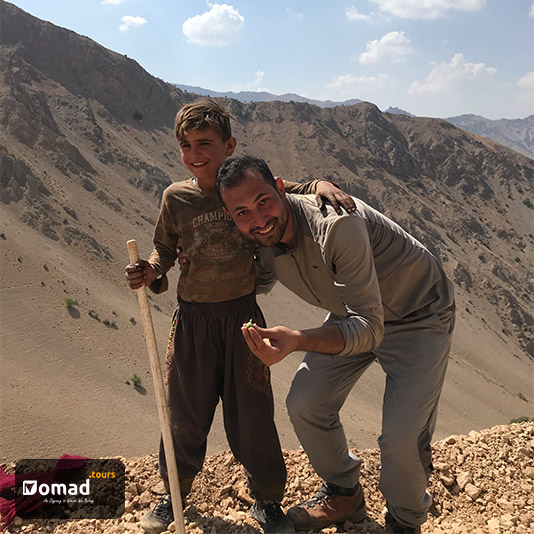
As a Bakhtiari, your personality is shaped by nature, and that’s very remarkable. I have never met a child, like Kianoush. He is wild and brilliant and so empathetic and so emotionally aware and very emotionally vulnerable. It’s an emotional intelligence I’ve never ever seen in a child at his age. And, that’s not always because of the hard life, no. It’s rather because there’s real accessibility within this community to the harder conversations, and the reality of life, they’re very open about it.
“They had disputes, the kids were sometimes nice to each other, and sometimes they had fights, sometimes Hossein & Jahan were grumpy with each other, sometimes very close. Just like any other normal family, and that’s what I really wanted to bring to this work: I didn’t want people to feel like this is an isolated tribe … (and I use ‘tribe’ (because I feel like that word has been misused & misplaced for a very long time), and I didn’t want them to feel that they are not like us. The thing is they are exactly like any other community that I have documented, only the backdrop is different. And a real priority in my work was to make sure this was intimate and close and relatable, and the dynamic between the children and the parents and the extended family, these are all relevant to our daily life. We can’t “other” these communities. We have to respect them, and value them and support them. And as I shared that I’ve done this kooch, an Iranian messaged me and said; “I’m so sad you’ve done this, everyone thinks Iran is just camels and sand, but it’s not true”, and it was interesting that she was quite ashamed that this could represent Iran! Well, Iran is possibly the most multi-faceted country I’ve ever been to. It would be impossible to ever tell the story of Iran, but I was surprised to see that her reaction was a little hostile, like feeling these people are lesser, are less educated. But whatever people might think or say, it’s not true at all. The nomads are just phenomenal people and I guess so much of their life is intangible, they live by a sense of chance, of risks. Everything has an intention. They never waste anything. They never waste their time. Everything is in synchronicity with nature. And I think this is what I want to be understood from the work more than the fact that this is just a tribe who walks kooch. Look at the values that these people have: they have shaped their land and the land has shaped them and they are in synchronicity with it. What can be more Iranian than the people who have shaped that land? And I really hope they are exalted in society a bit more. And what I really loved was that they weren’t judgmental of my lifestyle, they just wanted to understand and they respected my choice, and they did it really well.”
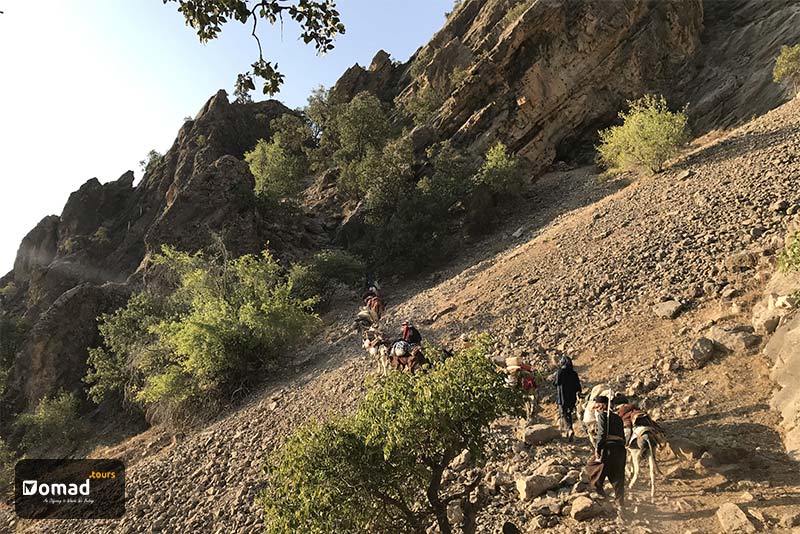
The nomads are just phenomenal people and I guess so much of their life is intangible, they live by a sense of chance, of risks. Everything has an intention. They never waste anything. They never waste their time. Everything is in synchronicity with nature. And, I think this is what needs to come true from the work more than this is a tribe who walks kooch. Look at the value that these people have; they have shaped their land and their land has shaped them and they are in synchronicity with it. What can be more Iranian than the people who have shaped that land?
IRANomad: Considering that nomadic cultures are fading away in Iran, do you think bringing tourists to experience Bakhtiaris’ Kooch will be empowering for them?
Emily Garthwaite: “I think the Bakhtiaries are incredibly unique, empowered and content people. They are making challenging choices that are reflective of the society, not so much of the downfalls of the community. They are open-minded, and they are willing to allow their children to go into the cities. It’s not like ‘they don’t want to be Bakhtiaris’. They’re not narrow minded – they realise they must adapt. Between the age of 18 and about 30, they may want to go to the city and experience urban life as well. Why shouldn’t they? And ultimately, what tends to happen, is they would come back to this community, once they get married or they have a degree or whatever they might want to do.. So, no, I don’t think they are fading away. Terms like ‘dying out’ or ‘fading away’ are rooted in colonialism. The language used to refer to indiginous groups is problematic, or overly romanticised. The history, and future, of the Bakhtiaris are fluid. The Bakhtiaris, be they nomads or those living in cities, will always be Bakhtiaris.
Emily Garthwaite: “Their lifestyle demands a lot of land and a lot of freedom, and I understand that any government globally always has issues with the nomadic communities’ need for freedom. Bakhtairis believe in their lifestyle; they believe in their culture. But they still become surprised when someone comes all the way to see them, and I feel they love having visitors. So, the dynamic of bringing tourists is very convenient, because it isn’t that the community is struggling and needs tourism to fund their lives, it’s more of an exchange program and an opportunity for the nomads to share some of their knowledge, particularly indigenous knowledge.. So, it’s about sharing knowledge rather than solely supporting a community, although that plays a huge role too. Supporting a community is listening, sharing their knowledge, and respecting their culture.
From the lengthy interviews I did with Bakhtairi families, it was clear that nomads don’t idolise the west, or capitalism, or globalisation. They see the value in their community, their history, preservation of land, and synchronicity with the natural world. Too many communities have lost their cultural identity for this global vision of the West. The nomads retain their culture and their cultural identity even when they go into the cities. They never ever lose sight of that. There is no rejection of their culture, identity, and roots, even under immense pressure. They are hugely resilient. It is a privilege to be in that sacred space and I think it’s amazing that IRANomads has been able to work within community development & form these sensitive, respectful and collaborative relationships with these families. It’s a very delicate set up, because it’s just about having this exchange, and I feel like it’s less for the nomads and more for the foreigners & others. Bakhtiaris know they are bringing other people into the space to learn from them. So, it’s not community development in the most typical of ways. But my hope is that this tourism will be managed, very gradually, comfortably, and with the right financial backing, because we don’t want to pay the nomads more than they would have in their normal lifestyle, so they can continue doing the work they do, because it’s very risky to shift to tourism, it has to be done very delicately.
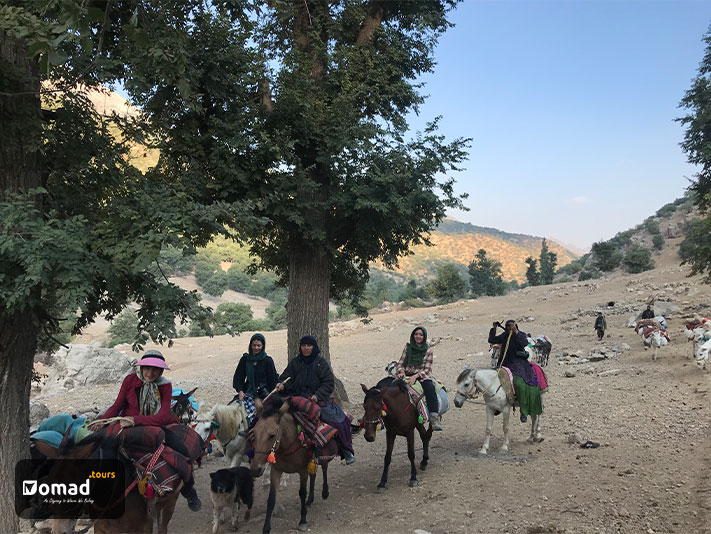
IRANomad: What do you find appealing about Slow Travelling?
Emily Garthwaite: I remember I spent 8 months in India and I never saw Taj Mahal, and then someone told me “oh my God, you haven’t seen India if you haven’t seen Taj Mahal”. And I never understood that. When I came to Iran for example, they said you need to go to every single city, but I always want to focus on one story, one community. I don’t feel like travel should be defined country by country but rather story & community. I’m not really interested in ticking countries off. I certainly don’t think you can understand a country in two weeks, you have to keep returning. I feel a sort of commitment to countries, so I’m not actually ‘well-travelled’, I’ve just been to very specific places for a long time.I like to spend my time. I am, day by day, decolonizing my mind. And I really enjoy challenging stories, stories that shape my life, that help me unlearn, and stories that celebrate under-represented communities. The Bakhtiaris’ story is challenging for me as a white foreigner, to come to Iran and tell stories of an incredibly complex and rich community.
IRANomad: What do you find challenging in telling these stories?
Emily Garthwaite: I am mindful of my whiteness, of being British, of being a foreigner, the history of colonialism. What my responsibility is, how I am viewing a country and how I am telling a story. I want to make sure to tell stories appropriately, respectfully, and help the community. I want to make sure that I support Iranians and I listen to their stories and voices and appropriately share those stories within the cultural context and don’t place my values on them.
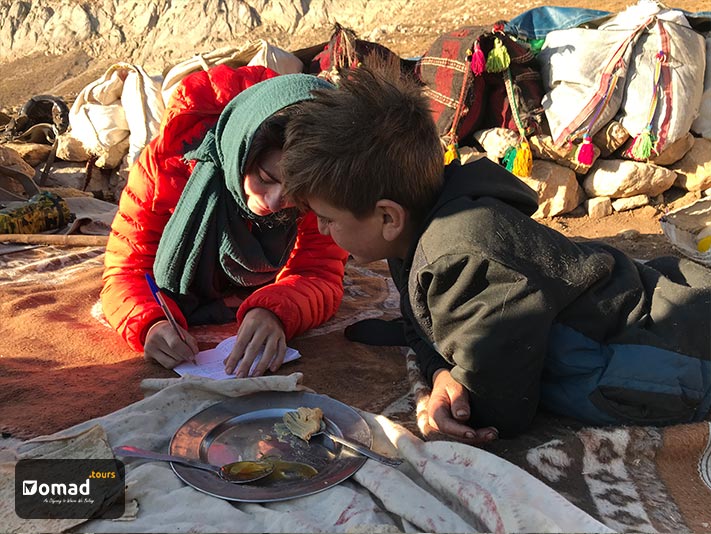
IRANomad: Did you find the journey tiring at any point?
Emily Garthwaite: Actually, I loved it. We did celebrate the days we were on the horse! We’d say “ah, today is a very good day” – a break from a lot of walking. Once you’re walking and walking with the family as a photographer, as a tourist, it’s probably different because you don’t have to keep up, but I had to keep up with them, because I had to photograph them. Muhammad is like a natural …and he’s so fast, but as for me, I’m not used to being in that landscape. It’s so difficult to navigate those mountainsides. I don’t know what was harder – going up, or coming down! I loved the challenge and felt so proud to be able to keep up, to work hard to be with the family, and push my body. So for a few days, I walked like crazy because I really wanted them to respect me so I tried really really hard for the first few days. I felt so proud to be involved in that dynamic. It was really interesting that I kept up with the family, I was involved in the family, I helped the family with the donkeys, we worked as a team. I think it’s important for the people to know that the Bakhtiari people find kooch hard too. It’s not a piece of cake for them either. They find things a lot easier than us, but they still find it challenging. It’s not an easy thing for anyone to do. If someone says to me “you left a sheep on top of the hill and you have to go and get it”, I’d say “I need a cup of tea, and I’m going to have a little breath!”, but for the Bakhtiaris, it’s simply: “ok, right, we’ll go up”.
You might think they have such a challenging life but in reality, this community finds the stuff we find challenging quite easy. They are able to go off tens of kilometres with sheep, and they do it with ease. They come back tired, but it comes naturally to them.
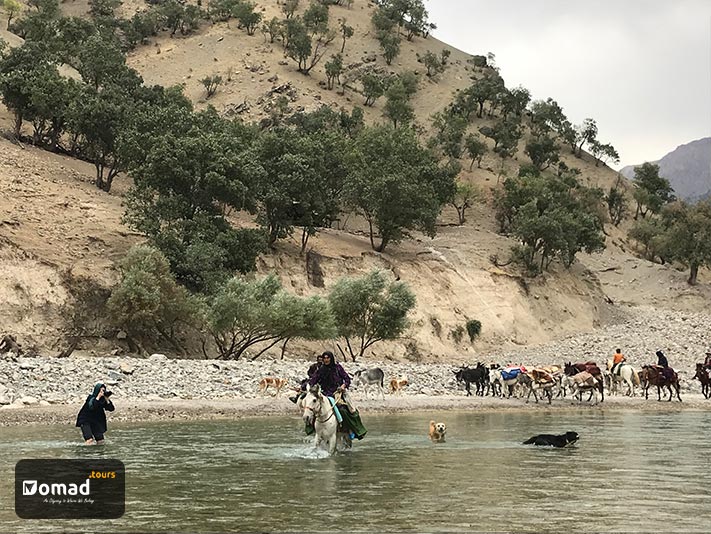
IRANomad: What do you think are the potential challenges of running these tours?
Emily Garthwaite: I think you’re just going to maintain a really really gentle balance. I think the concerns would be … we’ve done a press piece for this and a long form article of the time we stayed with the community. My worry would be that you will start to have a stream of people coming with cameras & phones and filming, and the consent in the relationships obviously after three days is only the very beginning. You need a lot of time with this community, how you can manage the concerns and respect for that community and sharing the stories without posting videos of the daughters online on social media. I won’t be sharing any photograph of Afsaneh, the daughter of the family on Instagram. It will only be published when the story is published and it will be in that piece. And, your tourism company needs to manage these dynamics, because you need people to know that they pay for the tour to walk with the nomads not to photograph nomads like a Safari, because it can very easily become that and we’ve seen that with many communities. I think you’ve got that balance so right. It’s very clear that you are coming to move with the community, you’re living with this community, you respect this community, and I didn’t take any pictures of them for quite a while and I was very reserved about it. And I hope that … and I know that you have travellers who are very conscious and won’t go there just to take pictures and they understand the community.
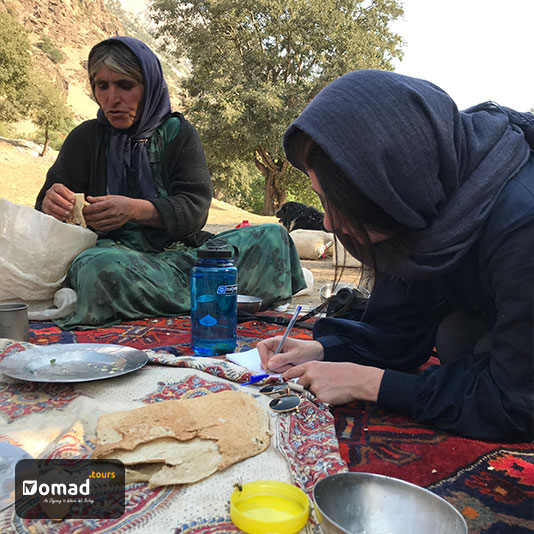
You need people to know that they pay for the tour to walk with the nomads not to photograph nomads like a Safari, because it can very easily become that and we’ve seen that with many communities just ending up being photographed as a part of a personal project. I think you’ve got that balance so right. It’s very clear that you are coming to move with the community, you’re living with this community, you respect this community, and I didn’t take any pictures of them for quite a while and I was very reserved about it. And I hope that … and I know that you have travellers who are very conscious and won’t go there just to take pictures and they understand the community.
Emily Garthwaite: We had our first bonding moment after a week. There was no point that I ever felt like I’m a foreigner. I was a part of the family member. They treated me like a family. There is no room for fluff, there’s no time. We’re living together, and you contribute positively and you share the courage. Don’t complain, never complain, just do it, do the time, and respect them, and I think the worst thing a foreigner could ever do is to complain because if you complain you are saying your lifestyle is not suitable for me. So, even if it’s really challenging, you just do it, because it will finally bring you a lot of joy. It might be difficult, but it brings joy to me that I’m supporting you, and your way of life … I can do this. It’s only 2 weeks. I would find it hard if it was a year, but that’s the role of a tourist: respect, respect, step up, arrive with good fitness. You need to be perfectly fit, and you need to bring good shoes, and just focus because you have to really step up for it, it’s not just climbing a mountain. the pace at the pace and if you don’t keep up, you won’t see them until the end of the day. I think it’s one of the best experiences I’ve ever had. I love people. I absolutely love people. I have always been fascinated by the extraordinary qualities that everyone has in them. I’m a detail-oriented person, and that’s why people are of interest to me. I don’t study people, but I notice everything. I always notice the dynamics, and this is something I’ve always had. I love to ask questions. And I really believe that by spending time with communities around the world, I can grow as a person. These are qualities I want to learn about and develop in myself. And the more experiences we have, and the greater understanding we have of how other people live, the more accepting we will be as societies. I can just bring home these stories to my friends and family. Within my family & friends these stories and my experiences shape a lot of the conversations we have. It’s an educational thing to share with people, and it’s a real gift, the job I have. I really don’t take it for granted, my friends want to get involved, and my family wants to visit Iran, I think I’ve made these places warm and accessible for them rather than exoticize and demonise them, or just reduce them to a post-conflict zone, or a conflict zone. I just hope to reflect another beautiful reality – someone else’s home.
.
IRANomad would like to thank the following. We are so grateful for their support. Without their help, it would have been impossible to plan the trip with Emily Garthwaite. special thanks to Fotros who helped with the visa procedure.
– Fotros Travel Agency
– Puppet Museum Hostel
– Javaheri House
– Koohrang Hotel
– Hanna Boutique Hotel
– Tehran Heritage Hostel